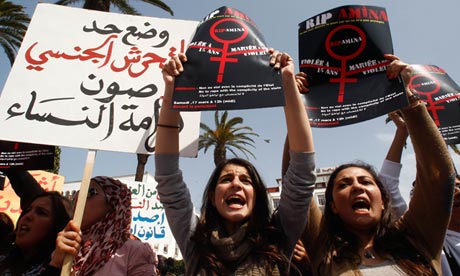The Guardian :
A suicide case and a campaign to stop rapists avoiding jail via wedlock finally brought change but further reform is necessary.

Women in Rabat protest in support of Amina Filali, who killed herself after having to marry a man she said raped her. Photograph: Abdeljalil Bounhar/AP
A law that allowed rapists to dodge jail by marrying their victims has been changed by the Moroccan parliament after a campaign by NGOs, including my organisation, the Association Marocaine de Planification Familiale (AMPF).
Previously, the law stated that anyone who "abducted or deceives a minor" could face a prison sentence under article 475, but a second clause of the article specified that when the victim marries the perpetrator, "he can no longer be prosecuted, except by persons empowered to demand the annulment of the marriage – and then only after the annulment has been proclaimed". This meant that prosecutors were not allowed to pursue rape charges independently.
The spirit of the 2011 constitution stated that men and women should be treated equally, which was at odds with article 475. We decided to set up an advocacy campaign to reform the law, and to challenge the right of judges to allow child marriage "for cultural and social reasons".
In parts of Morocco, particularly in rural areas, a girl or unmarried woman who is not a virgin, even if she lost her virginity through rape, is seen as bringing dishonour to her family. Marrying the rapist is thought to alleviate this stigma.
Go to link









Comments